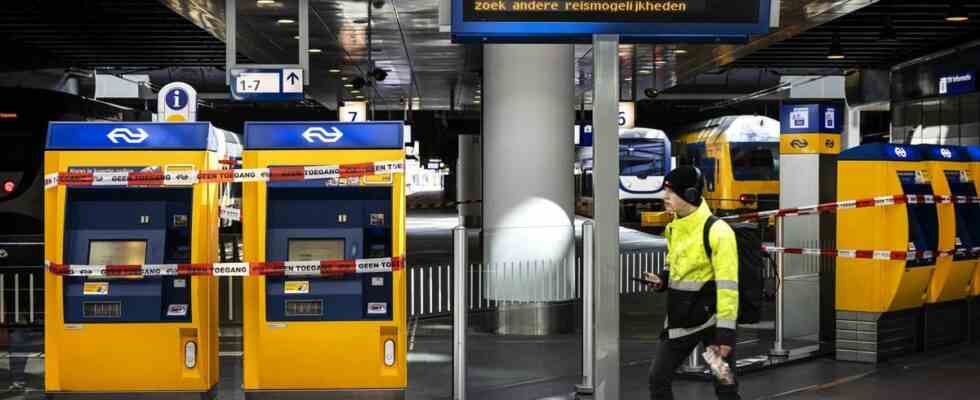After a massive technical disruption
:
Rail traffic in the Netherlands “almost back to normal”
Nothing worked anymore: On April 3, a person walks past ticket machines in The Hague that are wrapped in barrier tape.
Photo: dpa/RAMON VAN FLYMEN
updates Amsterdam On Sunday, rail traffic almost completely collapsed in the neighboring country. The reason was a technical fault; many travelers were stranded at the train stations. “Timetable almost back to normal,” said the state railway company NS on Monday morning.
After an extensive collapse at the weekend, train traffic in the Netherlands is running again without major disruptions. “Timetable almost back to normal,” said the state railway company NS on Monday morning at 5 a.m.
On Sunday, train traffic across the country had largely collapsed due to a system malfunction. According to media reports, thousands of travelers were affected after a system relevant to the safety of rail traffic failed around 10 a.m.
The disruptions also affected long-distance traffic between Germany and the Netherlands, where significant problems arose on Sunday afternoon. On the ICE route from Frankfurt (Main) to Utrecht, trains between Utrecht and Mönchengladbach were canceled in both directions. On the IC route from Berlin via Hanover to Amsterdam, train traffic was not interrupted. But there were delays.
“Although the cause of the disruption has now been rectified, the consequences are very great,” announced the state railway company NS on Sunday evening. According to media reports, thousands of travelers were affected after no more Nederlandse Spoorwegen (NS) trains had run since around 12 noon on April 3rd. Taxis were quickly in short supply everywhere, and regular buses were completely overloaded. Travelers told reporters they missed flights or put plans to the wind for the rest of Sunday.
“For a reliable restart, an update of the systems has become necessary and the trains have to be brought to the intended location,” explained NS. “It takes time.” At the same time, the railway company apologized: “This is not what our travelers can expect from us and what they are used to,” explained board member Tjalling Smit. “We will thoroughly investigate the cause and figure out how to prevent this from happening again in the future.”
NS initially announced that international trains were not affected by the disruption. In contrast, Dutch media reported that many people with foreign destinations, including Germany, were stranded at the main train stations in Amsterdam and Utrecht.
After hours of unclear exactly what the problem was, a railway spokesman said on Sunday that a system had failed that coordinated the scheduling of the trains, taking into account incidents such as diversions that are currently necessary. Without this system, security cannot be guaranteed. “And that is essential so that the traffic can take place according to the timetable.” According to the information, the trains of smaller regional railway companies ran normally.
A rail replacement service was not set up by the Dutch railways. It was not possible to use as many buses as would have been necessary to transport the affected train passengers, the reasoning was said. “I can well imagine that travelers don’t know where they are at the moment,” the spokesman told reporters on Sunday afternoon. “This is a real shitty day.”

